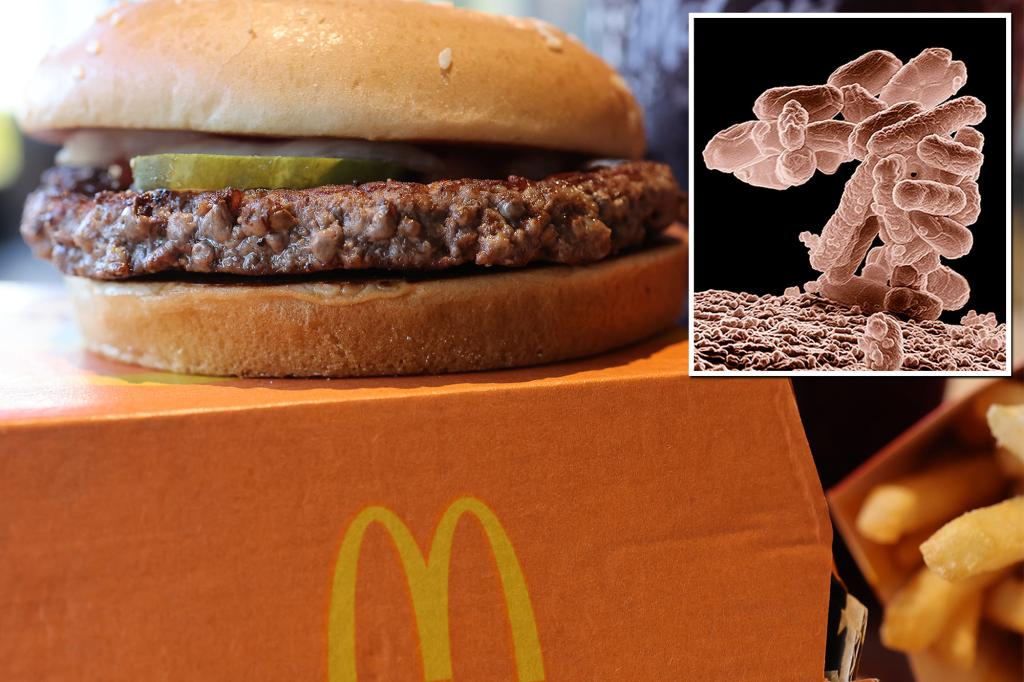A deadly E. coli outbreak linked to onion slices served in McDonald’s Quarter Pounder burgers has ended, the Centers for Disease Control and Prevention announced Tuesday.
The strain of bacteria associated with the outbreak has killed one person and infected 104 people in 14 states, according to the CDC. The agency said at least 34 people were hospitalized due to the outbreak, and at least four people developed hemolytic uremic syndrome. Hemolytic uremic syndrome is a rare but serious disease that can lead to kidney failure.
E. coli infection can cause symptoms such as diarrhea, abdominal pain, vomiting, and fever.

The FDA said that after testing the recalled onions and environmental samples taken from producers, both tested positive for a different strain of E. coli than the one involved in the outbreak. The agency said there is no human disease associated with this different strain. Additional samples obtained during the investigation tested negative for E. coli, the FDA said.
McDonald’s North America chief impact officer Michael Gonda and chief supply chain officer Cesar Piña said in a statement Tuesday that the CDC’s latest information “particularly supports doing the right thing, fast, and always putting people first.” This underscores the importance of our values.”
“Federal and state officials have repeatedly stated that our immediate actions in October made the risk to the public ‘very low,’ and the risk has remained very low ever since.”
The E. coli-related contaminated food was removed from McDonald’s supply chain as of October 22, the company said. No new illnesses have been reported since October 22nd.
“We know trust is earned, not given, and we’re working hard to earn back the trust of our customers,” a McDonald’s spokesperson said in a call with reporters Tuesday. I want everyone on this call to know that we are here.”
The burger and fries chain has invested $100 million in marketing efforts and franchisee support to revamp its tarnished image following the outbreak. Visits to McDonald’s restaurants plummeted in the week after the outbreak was announced.
The actual number of people infected with E. coli during the outbreak is likely much higher and may have come from many more states. This is because many people recover without undergoing bacterial testing or medical treatment.
A 6-year-old girl in Massachusetts died from E. coli. The mother believes she contracted E. coli after eating a McDonald’s cheeseburger before trick-or-treating. McDonald’s told the Post that public health officials have not linked any E. coli cases to McDonald’s restaurants in Massachusetts or the broader Northeast.
Dr. Stephen Ostroff, a former deputy commissioner at the FDA who is consulting with McDonald’s on the outbreak, said he understands the girl’s diagnosis is a different type of E. coli than the one associated with the outbreak.

The reported cases range in age from 1 to 88 years old and began showing symptoms between September 12 and October 21, according to the CDC.
Taylor Farms, which supplies McDonald’s sliced onions in states affected by the outbreak, has recalled yellow onions.
On October 22, McDonald’s temporarily suspended sales of the Quarter Pounder burger and removed onions from 3,000 stores. A McDonald’s spokesperson said the company stopped sourcing onions from both facilities and farms and turned to other suppliers within McDonald’s system who could fill the gap.
Less than a week later, the world’s largest fast-food chain resumed selling Quarter Pounder burgers from a different supplier in about 900 locations.
Colorado and Nebraska are the states with the highest number of cases linked to the McDonald’s outbreak. At least 26 people in Colorado have become ill, including one elderly person, according to the CDC. Nebraska has at least nine confirmed cases, the second-highest number of any single state.



